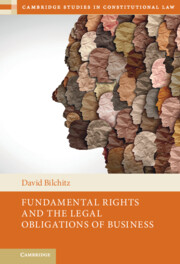Book contents
- Fundamental Rights and the Legal Obligations of Business
- Cambridge Studies in Constitutional Law
- Fundamental Rights and the Legal Obligations of Business
- Copyright page
- Dedication
- Contents
- Figures
- Tables
- Preface
- Acknowledgements
- Table of Cases
- Introduction The Question of Substantive Corporate Obligations for Fundamental Rights
- 1 The Nature and Purpose of the Corporation in Law
- Part I Legal Doctrinal Models for Addressing the Substantive Obligations of Non-State Actors for Fundamental Rights
- 2 The State Duty to Protect Model
- 3 The Indirect Application Model
- 4 The Expanding the State Model
- 5 The Direct Obligations Model
- Part II Towards a Multi-Factoral Approach for Determining the Substantive Content of Corporate Obligations
- Part III The Institutional Implications of the Multi-Factoral Approach
- Bibliography
- Index
3 - The Indirect Application Model
from Part I - Legal Doctrinal Models for Addressing the Substantive Obligations of Non-State Actors for Fundamental Rights
Published online by Cambridge University Press: 29 October 2021
- Fundamental Rights and the Legal Obligations of Business
- Cambridge Studies in Constitutional Law
- Fundamental Rights and the Legal Obligations of Business
- Copyright page
- Dedication
- Contents
- Figures
- Tables
- Preface
- Acknowledgements
- Table of Cases
- Introduction The Question of Substantive Corporate Obligations for Fundamental Rights
- 1 The Nature and Purpose of the Corporation in Law
- Part I Legal Doctrinal Models for Addressing the Substantive Obligations of Non-State Actors for Fundamental Rights
- 2 The State Duty to Protect Model
- 3 The Indirect Application Model
- 4 The Expanding the State Model
- 5 The Direct Obligations Model
- Part II Towards a Multi-Factoral Approach for Determining the Substantive Content of Corporate Obligations
- Part III The Institutional Implications of the Multi-Factoral Approach
- Bibliography
- Index
Summary
This chapter examines the ‘indirect application model’ in constitutional law whereby fundamental rights do not apply ‘directly’ to the relations between individuals but nevertheless influence the content of the private law legal rules that apply between non-state actors. The legal rules though articulate the obligations of non-state actors and, if fundamental rights affect those rules, they affect the obligations of non-state actors. I argue that the indirect application model has several drawbacks – including weakening rights and undermining their relational dimension - but ultimately collapses into a form of direct application model. I thus examine, through this lens, seminal cases in Germany and South Africa, seeking to understand what approach courts utilize to construct the substantive content of the obligations of non-state actors. The analysis highlights that courts draw on a number of factors together with an amorphous balancing process to determine those obligations – similar to the other models analysed in the book.
Keywords
- Type
- Chapter
- Information
- Fundamental Rights and the Legal Obligations of Business , pp. 99 - 134Publisher: Cambridge University PressPrint publication year: 2021

